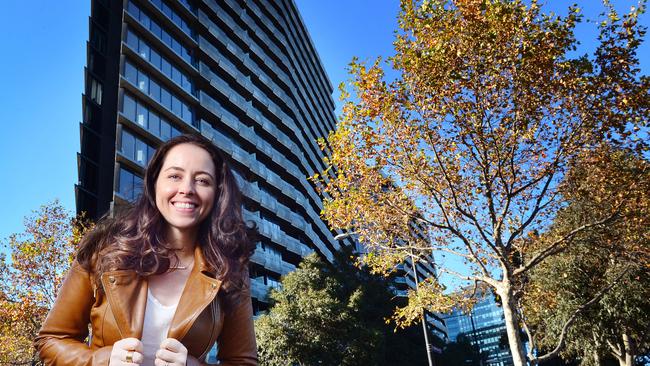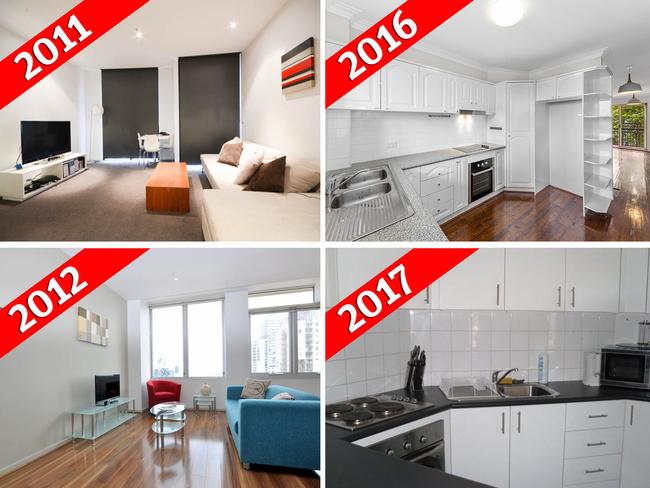Property investor shares her secrets to striking it rich in real estate
EMILIA Rossi bought four lucrative properties using “very little” savings — all by her early 30s. Here’s how you can do it too.

EMILIA Rossi owns four properties and is an avid cryptocurrency and share market investor — but she still rents.
In fact, renting is both a lifestyle choice and a clever financial strategy for the 34-year-old lifestyle entrepreneur, who lives in an apartment in Docklands in Melbourne’s CBD.
“I rent everything I have. I sold my car one and a half years ago and I rent cars or use Uber or GoGet,” she said.
“Here in the city, owning a car doesn’t make sense, so I rent out my car spot because that makes more sense for my lifestyle.”
She said for inner-city dwellers such as herself, renting is actually cheaper than paying off a mortgage.
“I wouldn’t necessarily have this lifestyle in the suburbs because the cost of a two or three bedroom place is around half, so it would be cheaper to pay off a mortgage in the suburbs,” she said.
• THE ‘FATAL MISTAKE’ ON YOUR CV
• INSANE $200 PER WEEK BONDI RENT AD
• BUYER PULLS OUT OF $2.3M ‘PORN HOUSE’ SALE
But renting in an inner-city apartment complex allows Ms Rossi and her young family to take advantage of facilities such as pools and gyms without having to fork out for the strata fees that go with them for owners.
It also allows her to sidestep property disputes and enjoy greater flexibility to move on when desired.
Ms Rossi, who runs the Emilia Rossi lifestyle blog and the award-winning wedding marketplace Capriess, has always been savvy about property after purchasing her first investment property in Canberra in 2011 at just 25 years of age with no financial support from her parents.
She followed it up with another property purchase the next year, followed by two more in 2016 and 2017.
The mother of one, who also makes a living as a digital consultant and jewellery designer, said “very little savings” were needed to purchase her investments.
“I have four investment properties and it’s not about quantity, it’s about quality,” she said.
“I was 25 when I bought my first one and I was lucky enough that the first property had enough equity in it that I was able to refinance it and get a second property and refinance that and get a third and so on.
“Throughout the whole process I’ve put very little savings in — I’ve relied heavily on the fact I’ve been able to refinance the loans on all the properties to finance the next one. I’ve got fantastic rental returns on three of them, and I know exactly what I need to do to target that perfect, corporate tenant who will pay top dollar.”

She said her “sole objective” for her fourth property was capital growth and not rental return.
“The sole purpose is to get as much capital growth over the next five years because I want to be able to refinance, grab cash and do something else,” she said.
“I describe myself as ‘high risk’ because every six months I look at my financial situation and look at what the next step is whether it’s investing in cryptocurrency or superannuation.
“It’s all about diversifying your risk. Initially I was all about property but you shouldn’t put all your eggs in one basket.”
While Ms Rossi does not describe herself as a real estate expert, she said she believed there was still money to be made in property despite an expected downturn in some parts of the country.
She said it all came down to research.
“It pays for people to go and have a look at the historical data in the surrounding areas, consider access to infrastructure and schools to determine the best property,” she said.
Ms Rossi bought all four properties with interest-only loans and recently changed one to a principal and interest loan — but she said she was now re-evaluating her loan strategies following a recent bank crackdown on interest-only loans.
“Now banks are penalising people with interest-only loans, an increase in interest rates would affect my bottom line because with three home loans, the interest I repay is quite high,” she said.
“At the moment everything that was positively geared is now negatively geared so I’m looking at the entire structure moving forward, and what I need to do — do I change all the loans to interest-only loans? Or put more money back into paying down loans?
“What that means for the next three to five years I don’t know. Right now it has caused me to think again but it’s great, because I need to be agile and flexible.”
Her best financial advice for other young people was to invest in education and yourself, get as much advice from experts as possible and to diversify rather than investing purely in property or the share market.
INTEREST-ONLY LOANS:
Interest-only loans defer the repayment of the loan principal — the initial value of the loan — for a certain time period, most commonly three to five years.
During that term, buyers pay off only the interest of the loan.
Regulators have recently targeted these loans because they are worried low repayments are pushing buyers to take on too much debt as well as adding to the hot real estate market.



